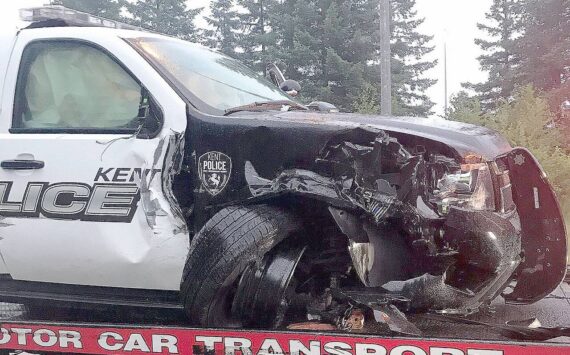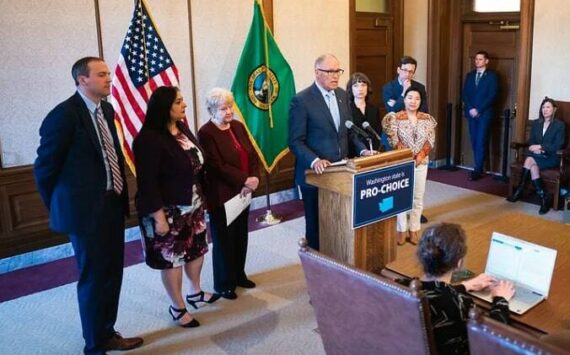OLYMPIA — A Democrat-drafted response to soaring Sound Transit car tabs passed out of a House committee Monday with backing of several Republican lawmakers.
The House Transportation Committee voted 20-5 to approve the bill forcing Sound Transit to change a key component in calculating its motor vehicle excise tax to lessen the financial hit from a voter-approved hike in the tax rate.
Under House Bill 2201, the regional transit authority must stop using a 2-decade-old depreciation schedule which overvalues vehicles and start using one adopted by the Legislature in 2006 which better reflects a car’s actual worth.
Sound Transit would give owners a credit for any extra they paid under the old method, or a refund if they’ve already spent money to renew their tabs. This approach would provide an estimated $780 million in rebates for car owners through 2028, according to Democratic lawmakers.
While this would reduce a stream of revenue on which Sound Transit depends for future expansions, Democrats said it won’t impair the transit agency’s ability to carry out the $54 billion worth of projects in the Sound Transit 3 plan as promised.
However, if the reduction in car tab revenue did threaten to delay projects, the House bill requires Sound Transit to spend less on parking structures and commuter rail to ensure planned light rail extensions stay on target.
“We can do this if we’re smart about this,” said Rep. Mike Pellicciotti, D-Federal Way, the bill’s sponsor. “We can do this and still carry out the will of the voters.”
In Monday’s committee hearing, Rep. Mark Harmsworth, R-Mill Creek, offered an amendment aimed at achieving what he called a “slightly more aggressive” approach to deliver greater relief to consumers.
His amendment sought to halve the excise tax rate, triple the credits and require Sound Transit to trim spending on light rail projects if it finds itself shy of revenue to carry out the entire Sound Transit 3 program. It was defeated on a party-line vote.
Harmsworth, the point man for House Republicans on this issue, did vote for the Democrat bill.
“We do believe the underlying bill does provide a small amount of relief. We’ll take what we can get at this point for our constituents,” Harmsworth said.
Afterwards Pellicciotti interpreted the lopsided vote as a sign the House is moving in the right direction on resolving a contentious issue.
“When you have a common sense solution to a problem that can sometimes bring together people from both parties,” he said.
In November, 54 percent of Sound Transit voters backed the massive three-pronged tax package to pay for the expansion. It included a new property tax, a sales tax hike and an 0.8 percent leap in the vehicle excise tax. As of March 1, the excise tax went for 0.3 percent to 1.1 percent.
This issue exploded in February as residents received their car tab renewal notices calculated with the increase and found themselves owing hundreds of dollars more than the year before.
From the outset, Republican lawmakers have demanded Sound Transit switch to using vehicle values in the Kelley Blue Book or from the National Auto Dealers Association, both of which they consider to be fairer than either of the state schedules.
The Republican-led Senate on April 6 passed a bill that requires use of a new valuation method, cuts the excise tax rate to 0.5 percent and makes Sound Transit begin paying for road improvements. It was approved on a party-line 25-24 vote.
Meanwhile, Democrats in both chambers initially resisted making Sound Transit change its ways out of concern any move could jeopardize the delivery of light rail to Everett and Tacoma, communities which have been paying into the system for two decades.
Now, Democratic leaders in both chambers agree Sound Transit should use the newer depreciation schedule and give owners a rebate.
“I think we’re right where we should be. This is a bill that actually solves the problem,” said Rep. Judy Clibborn, D-Mercer Island, chairwoman of the House Transportation Committee, referring to the House bill.
Republicans will continue “working to get a much stronger amendment passed” when the Pellicciotti bill reaches the House floor, said House Minority Leader Dan Kristiansen, R-Snohomish. A vote could come as early as Wednesday evening.
GOP members of the committee “did not think this was actually solving the problem. They said all it was providing was minuscule relief,” Kristiansen said, describing it as “10 cents on the dollar relief.”
Jerry Cornfield: 360-352-8623; jcornfield@heraldnet.com. Twitter: @dospueblos.







